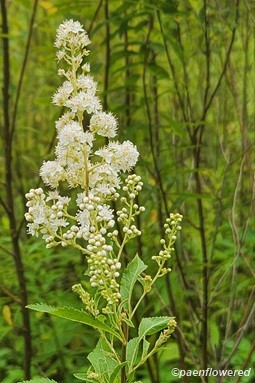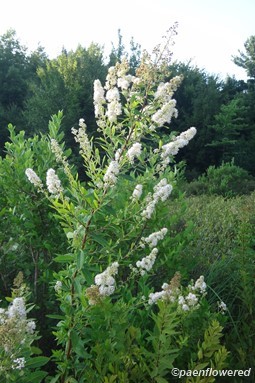Spiraea alba
A plant of the wetlands with fragrant spikes of white flowers
Spiraea alba white meadowsweet
Add to MyPlants View Locations
This native deciduous perennial shrub of the rose family produces clusters of fuzzy flowers in a roughly conical shape. These clusters are usually 2-6 inches long. The flowers are usually white, but occasionally light pink. Individually the blossoms are about ¼ inch in diameter and have 5 petals and 5 shorter sepals, and numerous stamens. Normally there are 5 pistils, surrounded by a colored narrow ring-like structure where the nectar glands are located. The brown fruits are follicles with a beak that split along one side to release the seeds. These are specific to the genus Spiraea.
The leaves are elliptical, mostly or completely hairless, and coarsely toothed. The older woody stems are hairless and reddish in color when mature. Younger stems are green. The sparingly branched plant can grow 2-6 feet tall. The root system is woody. Historically these hollow stems were used to make pipes. Meadowsweet blooms from June to September, attracting various kinds of bees, wasps, and beetles as pollinators. This species grows in rich, damp meadows and fields and ranges from Alberta to Newfoundland Canada, and northeastern and northcentral United States but further south in the mountains. It is found in almost every county in Pennsylvania.
The broadleaf meadowsweet (Spiraea latifolia) is similar in appearance but has broader leaves & red-brown twigs. In colonial America, an infusion of the dried leaves of both species of meadowsweet, sweetened with honey were a favorite diet drink and diuretic. The root was also used as a herbal medicine for the treatment of fever. Some botanists classify broadleaf meadowsweet as a subspecies (Spirea alba ssp. latifolia) rather than different species. There is an introduced species of meadowsweet that is more commonly used as a garden ornamental - it rarely escapes cultivation. A similar shrub with red flowers is the steeplebush (S. tomentosa).
Habitat & Range
Frequent in bogs, swamps, and moist meadows.
Present throughout the state.
| EMP: | FACW |
|---|---|
| NCNE: | FACW |
Phenology
Flowers June through September.
Similar Species
Spiraea latifolia
Twigs are purple-brown or red-brown, while S. alba has dull brown or yellow brown twigs (when mature)
Leaves appear more broad than those of S. alba (2 to 3 times as long as wide)
Plant Codes
S-rank: No Rank
G-rank: G5 (Secure)
Spiraea alba white meadowsweet
Synonyms: Spiraea alba ssp. alba, Spiraea alba var. albaAdd to MyPlants View Locations









Comments
Have you spotted this plant in your area? We'd love to hear about your experience! Share your comments or questions about the plant below. Comments are moderated before posting.